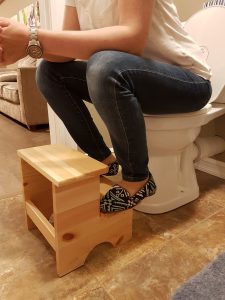Could the way that you’re sitting on the toilet be contributing to a prolapse? Maybe!
A pelvic organ prolapse is when the bladder, uterus and/or rectum lower into the vaginal canal. Women complain of pressure or irritation inside or near the opening of the vagina, a heaviness sensation, and can sometimes see organ tissue at or protruding from the vagina. Distressing to many, but don’t panic!
Many of my patients notice that they feel these symptoms following a bowel movement. If you notice the same thing, then keep reading for a few tips to help reduce the pressure when on the toilet.
- Manage your constipation – Ladies, this is no joke. The goal is for at least one soft, sausage shaped poo per day. No straining. No pain. Monitor your water intake, fiber intake and talk to your preferred healthcare professional (doctor, pharmacist, dietician, naturopathic doctor) if your poops are out of order! Straining puts pressure on those lowering organs and we want to reduce pressure as much as possible.
- Knees at least slightly higher than hips – You can use a step stool, a fancy squatty potty, or even some yellow-pages phones books. Just get those knees up and feet supported! The height of the step stool will depend on the height of your toilet and your leg length. Having your knees higher than your hips helps to fully relax the pelvic floor muscles (the muscles that help to close around the rectum). The last thing you want is to be pushing down against a rectum that is closed.
- No slouchy sitting – I get it. You’re tired. But sitting with an extreme slouch and bearing down to have a bowel movement puts more strain against the vaginal walls. If you look down and you can see your genitals, straighten up! I tell my patients to aim for the drain in the back of the bowl.

Slouching Sitting – Likely puts more pressure on the vaginal walls

Supported Sitting – Knees elevated higher than hips and feet supported
4. No purple pushing – No holding your breath and bearing down. See constipation advice above. But some people just have a bad habit of holding their breath while pushing. Always let at least a bit of air out as you bear down for pressure.
Hopefully those tips help to reduce pressure and prolapse symptoms. If you are struggling, you can always schedule an appointment with your nearest pelvic floor physiotherapist for more guidance.
Katie Kelly, Physiotherapist
BSc., MSc. PT







